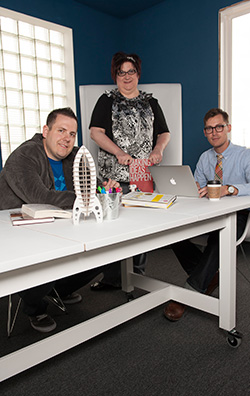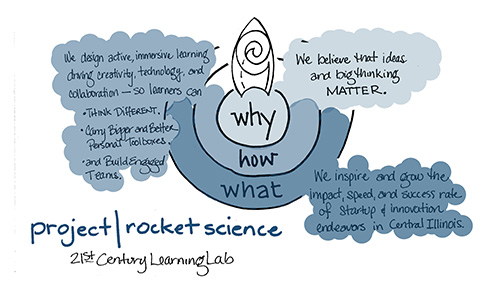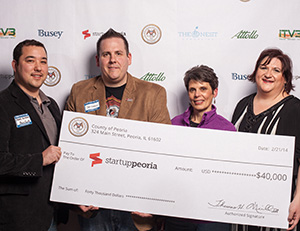
A growing movement of young entrepreneurs is taking the region by storm.
For years, popular opinion has dictated that to be successful in science, technology or startup ventures, one must relocate to Silicon Valley, the U.S. hub for technological innovation and venture capital. But the myth that businesses can only grow in northern California is being debunked as entrepreneurial communities sprout and flourish all across the country. Today, the next great business idea can come from anywhere.
With more than 600 Illinois-based ventures registered through the Startup America Partnership, it’s no surprise a substantial chunk of Midwestern startups are based in Chicago. But Peoria, too, has a strong presence on the entrepreneurial scene, from CNC motor/systems provider Probotix on Allen Road and Ear in the Envelope, a top Etsy seller located in the Warehouse District, to up-and-coming technology firms NEXMachine and OneFire Media, both headquartered at the Peoria NEXT Innovation Center—just to name a few.
Founded by self-described “serial entrepreneur” Jake Hamann, OneFire has grown into one of Peoria’s key digital consulting firms. Having found space at the Innovation Center in 2012, the company is now staffed by 18 employees who work in digital publishing, app development and augmented reality in collaboration with the likes of Caterpillar, Maui Jim and OSF’s Jump Trading Simulation & Education Center.
As OneFire was beginning its expansion, Hamann picked up a copy of Brad Feld’s Startup Communities, a guide to forming strong entrepreneurial ecosystems in any city, regardless of size or location. Inspired, he knew something had to be done to maintain Peoria’s competitiveness in the nation’s rising startup movement. In addition to the untapped fountain of talent he saw at existing local companies, Hamann had watched as young college graduates left the region, believing there was little opportunity for their ideas to thrive here. A dogged determination to reshape this dynamic was key to the creation of Startup Peoria.
Off to a Running Start
A few years ago, Hamann reconnected with Amy Lambert, former “creative rockstar” at Heart Technologies, whom he’d met in 2009 while she was building ci | creative, a now-defunct organization which facilitated connections among central Illinois’ creative professionals. They agreed Peoria needed a group dedicated to drawing entrepreneurs and creative types out of the woodwork—and keep them from packing up for northern California or elsewhere—in the interest of strengthening the local startup ecosystem.
“We’ve got to do this,” Hamann recalls saying to Lambert, whom he hired as OneFire’s director of learning and creative technologist. “More than just for our company—for the entire community.” So the two put their heads together and came up with Startup Peoria, an organization dedicated to bolstering the entrepreneurial ecosystem right here in the River City.

Last April, while attending the Everywhere Else Conference in Memphis—which focuses on the startup ecosystems outside of Silicon Valley—Hamann and Lambert had a fortuitous meeting with conference speaker Scott Case, founding CTO of Priceline.com and CEO of the Startup America Partnership. “We blurted out all these great plans,” Hamann recalls, “and I remember him looking at us and [saying], ‘Stop.’” Case advised them to take a year to spread the word about their mission, saying, “All of those ideas are really great—for 2015.”
Taking his advice to heart, Hamann and Lambert began to look for ways to bring Peoria’s entrepreneurs together. By the end of last year, the pair had attended several other national conferences, made innumerable connections with startup veterans, and spent time “building the hype” before truly kicking off Startup Peoria’s activities. As Hamann explains, this region’s entrepreneurs have been “siloed”—that is, isolated (in basements, home offices, cubicles, etc.) from other like-minded professionals—a significant obstacle to growing 21st-century startups, which tend to thrive on the social dimension. “We want to enable this ecosystem,” Hamann says, “to help entrepreneurs in central Illinois be successful.”
Going Above and Beyond
“Entrepreneurs are responsible for all of the job growth we have seen as a nation,” reports Lambert. “While established organizations have shrunk, the new jobs have been created by entrepreneurs.” In 2010, the Ewing Marion Kauffman Foundation—the nation’s largest nonprofit dedicated to fostering entrepreneurship—published “The Importance of Startups in Job Creation and Job Destruction,” a report examining net employment growth in the U.S. from 1977 to 2005. The data backs up Lambert’s assertion, showing that startups have created an average of three million jobs per year for nearly three decades—a rate that remained stable through the recent downturn—while existing firms actually lost about a million jobs each year during the same period.
Simultaneously, a huge social and economic shift toward technological innovation has taken place over the last decade, with mobile computers, smartphones and Internet access now essential to nearly every industry. This seismic shift is impacting business models, professional relationships, marketing campaigns, product design and manufacturing processes—essentially, every significant function within any given company. Educating professionals about technology is an important aspect of Startup Peoria; not only does it go hand in hand with 21st-century entrepreneurship, it makes it possible. “More people who have ideas,” says Lambert, “can find ways—ways that are built now that did not exist five years ago—that give them the means to be successful.
“That’s why Startup Peoria is making such a difference,” she continues. “Not only do we have the entrepreneurial drive, there’s a level of tech know-how and 21st-century process know-how that’s making the difference.” In fact, this emphasis on technology and the 21st-century paradigm shift could be what makes entrepreneurship so popular with the coveted 25-to-44-year-old demographic.
According to a 2011 Kauffman Foundation survey, over half of millennials either had an idea for a business or had already started one, thanks largely to advances in mobile technology and the ease of online operations. As outlets for creativity and new ideas, startups offer attractive opportunities for young professionals, and as more and more businesses can be run entirely on laptops and tablets—with fewer office resources and staff—millennials clearly see the roadmap to being one’s own boss. Today, more than 16 million U.S. workers are considered independent professionals or freelancers, and they can be found in every corner of their communities.
Peoria is proving no different. “We’ve got great talent here,” Hamann affirms. “When people think of this region, we want them to think of… what we’re trying to enable with the startup community.” Part of Startup Peoria’s charge is to spread the word about the amazing things happening in central Illinois, particularly in the interest of attracting even more innovative thinkers to the region.

Birds of a Feather
Over the last year, Hamann and Lambert’s efforts under the Startup Peoria banner have spanned a range of activities. Prominent among them is Startup Weekend, an international network of events focused on generating ideas and establishing the viability of new business ventures. Held at Bradley University last November, Peoria’s event featured 72 aspiring entrepreneurs—many of them students at Bradley, Midstate College and Eureka College—making pitches, networking and kicking off new companies. The 54-hour event resulted in at least three new startups—MuzMee, TagUp and SoCo—all of them social and technology-driven.
Perhaps even more popular is 1 Million Cups, a nationwide program led by the Kauffman Foundation. Held by Startup Peoria on Wednesday mornings, it involves weekly gatherings of entrepreneurs telling their stories, offering feedback and forming connections. Peoria is one of 35 affiliated communities across the country hosting the meetings, which have become so popular their base of operations has moved from Sugar Wood-Fired Bistro to the La Ville de Maillet building next door (820 SW Adams) to accommodate their growing numbers. With speakers ranging from iTV-3’s Levi Dinkla to Jon Williams of J.K. Williams Distilling, 1 Million Cups has quickly become a fixture in Peoria’s nascent startup community—testament to a latent appetite for entrepreneurial opportunities across the region.
But classic entrepreneurs are not the only source of innovative ideas, Lambert notes; they also arise from a more common, but less-discussed group known as intrapreneurs. “Intrapreneurship is much the same as entrepreneurship,” she explains, differing only in that intrapreneurs implement their ideas through existing companies rather than startups. Developing the entrepreneurial mindset within potential intrapreneurs—showing that they, too, have the ability and resources to implement their ideas—“is one of the most important pieces of education [Startup Peoria] can provide,” says Lambert.
Indeed, another Startup Peoria initiative is addressing this very topic. Project | Rocket Science is a 21st-century learning lab that aims to educate entrepreneurs and intrapreneurs alike through project-based classes, study groups and action teams. In April, a pilot workshop was held at the Peoria NEXT Innovation Center for the staff of Radio Peoria to inspire innovative thinking within the Cumulus Media affiliate. A brainstorming session ensued, with a variety of new ideas shared and refined, and processes for their implementation developed. “It’s rare in the hustle and bustle of the radio station that we get the opportunity to just sit down and do nothing but brainstorm,” says Jennifer Smith, morning drive DJ on NASH FM 97.3, “so this was a pretty cool way to think out of the box.”

Sharing Is Caring
Integral to all that Startup Peoria does is collaboration—the driving force behind its recent launch of The Nest. Located above Sugar in the Warehouse District, this new coworking space allows entrepreneurs, remote workers, freelancers and self-employed professionals to leave the isolation of home offices or the distraction of public cafés for a dedicated work environment among their peers. Randon Gettys, Startup Peoria’s community engagement manager, notes that the local startup movement now has not only an identifiable community, but also a headquarters.
“Human beings are social creatures,” Gettys explains. “What we’re trying to do is offer a place… for independent professionals to come and work… independently, but in a group setting.” The coworking initiative fosters collaboration in a business-centered environment where ideas can be shared and developed, and mutual motivation can bolster productivity. The Nest features open and dedicated desks based on membership levels, which range from full-time to day passes; other perks include a conference room, craft coffee from Thirty-Thirty Coffee Co., and a shared technology infrastructure, including fiber-optic internet access via iTV-3, delivering users the fastest speeds in town.
The Nest’s location in the Warehouse District is no accident. Currently in the midst of a multi-year, multi-million-dollar redevelopment, this part of downtown Peoria is “where things are really starting to turn around,” says Hamann. As the city tries to lure young professionals to live and work in this up-and-coming urban environment, the startup community bolstered by The Nest and Startup Peoria’s array of initiatives can play a significant role in supporting the cause, as young professionals make it an epicenter for new ideas and companies.
And that’s not all for Startup Peoria. Soon, it expects to launch Peoria Made, a website and brand featuring an ecommerce platform for local sellers and an online directory to promote local entrepreneurs and products. Lambert describes numerous other programs in the works, including the Ice House Entrepreneurship Program, delivering a deeply needed mindset shift into entrepreneurial thinking; a Makers Lab, which would offer prototype design services and educate the public on cutting-edge manufacturing processes like 3D printing; and Last Friday’s Lunch with TED, informal gatherings to share and discuss seminar talks by the international nonprofit dedicated to spreading the word about innovations in technology, entertainment and design.
Great Minds Think Alike
Citing one TED Talk in particular as her own personal inspiration for becoming an entrepreneur, Lambert reports that author Simon Sinek’s 2009 presentation, “How Great Leaders Inspire Action,” was also the driving force behind February’s “Start With the Why” event. The well-attended gathering served as an opportunity for Startup Peoria to explain its mission to the public—and pick up a $40,000 check from Peoria County to support its operations.
Using Apple as an example, Sinek suggests that many of the world’s most successful businesses thrive because they focus on the Why—the beliefs, core values and purpose of a company (besides profit)—before expanding to the How (the processes behind a product or service) and the What (the product itself). “People don’t buy what you do,” he asserts, “they buy why you do it.”
Lambert observes that most of the entrepreneurs she’s met in the area have adopted this notion in their own businesses. “Everybody has their own why,” she declares, “why they passionately commit to something.” In the future, she adds, “Start With the Why” will become an ongoing series of information sessions—“a learning program that helps business leaders figure out why you’re doing what you’re doing and then, why your company exists.”
“It’s shaping up to be an amazing future,” continues Lambert, emphasizing Peoria’s niche as a global hub for business and manufacturing, with Caterpillar and the like having achieved international scope. Thanks to the emerging entrepreneurial ecosystem being nurtured by Startup Peoria, the region is poised to continue developing powerful new companies—“and that company could be yours,” she asserts with a smile. “It starts with your own belief and mindset that your idea is valid and worthy. That you can make a difference.
“And then it’s just a matter of time.” iBi
For more information, visit startuppeoria.com.

